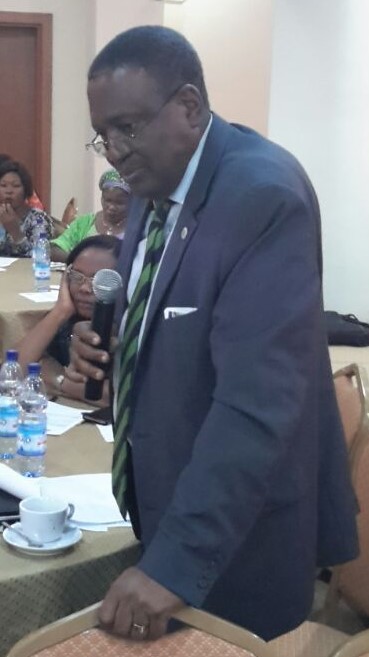Nigeria has underscored the need for the proposed actions for strengthening the Science-Policy Interface in the BRS Conventions.

At a side event held on Tuesday, April 25, 2017 during the 2017 Conferences of the Parties to the Basel, Rotterdam and Stockholm (BRS) Conventions holding in Geneva, Switzerland, the West African country suggested the adoption of a comprehensive road map to actualise this suggestion.
A major decision to be taken by the BRS COP 2017 is on the need to strengthen the science-policy interface and to consider establishing a Science to Action road map for further engaging Parties and other stakeholders in an informed dialogue for enhanced science-based action in the implementation of the BRS.
The Nigerian stand was unveiled in a presentation titled: “The need for science-policy interface” delivered by Professor Babajide Alo of the University of Lagos during the side event, which was organised by Nigeria in collaboration with the GEF-STAP (Scientific and Technical Advisory Panel) and the BRS Secretariat.
Pointing out that, as good policies for sustainable development will require the best possible science, the Professor of Chemistry clamours support by policy makers of strategies to strengthen partnerships between the science community and the BRS Conventions.
According to him, capacity-building of scientists and increased dialogue between scientists and governments/policy makers especially in developing countries and CEITs is crucial, in order for scientists to provide policy relevant advice.
“The case of the IPCC shows that there can be close interaction with policy makers throughout the scientific process, without compromising on the independence of scientists,” he stated.
Prof. Alo, who is a Fellow of the Nigerian Academy of Sciences (NAS), adds that awareness raising of all stakeholders of the science behind emerging environmental issues is also critical.
“As Glaser and Bates posited in 2011, education and awareness raising in Science for policy is of vital importance for the process and this can be achieved through educating the public and policy makers about scientific processes and scientific findings, so that they will be more engaged and interested in the entire process of scientific research; training of new scientists, in developing countries through improving education and capacity-building,” he stressed.
Prof. Alo emphasised that, besides educating scientists on how to effectively communicate their findings, more funding to support generation of relevant scientific data and new knowledge to assist decision-making and policy development will also positively impact the importance of the science-policy interface.
Essentially, Prof Alo in the paper reaffirmed that scientific assessments do underpin and have globally been used by all legally binding instruments to inform the decisions made by the Conferences of the Parties (COPs) of the Conventions, and that the triple Conventions of the BRS cannot be different as the Basel, Rotterdam and Stockholm conventions are indeed science-based, legally binding global treaties.
He recalls that several paragraphs of the UN Environment Assembly (UNEA 2) in 2016 especially the Resolution 2/7 on Sound Management of Chemicals emphasised the importance and need for good science to inform policy.
“Scientific knowledge and appropriate technologies are central to resolving the economic, social and environmental problems that make current development paths unsustainable. Hence there should be an intimate connection between the scientific and policy making communities. Such a connection will help make research and scientific information more policy-relevant, and policy development and implementation more science based,” he noted.
Prof Alo says that despite clear scientific evidence of the importance of scientific knowledge, the implementation of sustainable development issues in developing countries has to a large extent failed so far. He attributes this to “serious disconnect between scientific knowledge generation/availability and the way that policy is formulated, and there often seems to be a lack of urgency among policy makers when addressing sustainable development issues leading to calls for improvements in the science-policy interface.”
His words: “Many policy decisions in many developing countries like in Nigeria and CEITs are taken even in the absence of full scientific certainty. Such countries use scientific data from other countries to make decisions in recognition of the precautionary approach. Good examples of science-policy interface global level include the Montreal Protocol On Substances That Deplete The Ozone Layer and the UNFCC with the IPCC mechanism. The Intergovernmental Panel on Climate Change (IPCC) is today perhaps one of the best examples of a body which combines full scientific credibility with full policy relevance and high political legitimacy.”
The thirteenth meeting of the Conference of the Parties to the Basel Convention (BC COP-13), the eighth meeting of the Conference of the Parties to the Rotterdam Convention (RC COP-8) and the eighth meeting of the Conference of the Parties to the Stockholm Convention (SC COP-8) commenced on Monday, April 24, 2017 and will come to a close on Friday, May 5.
